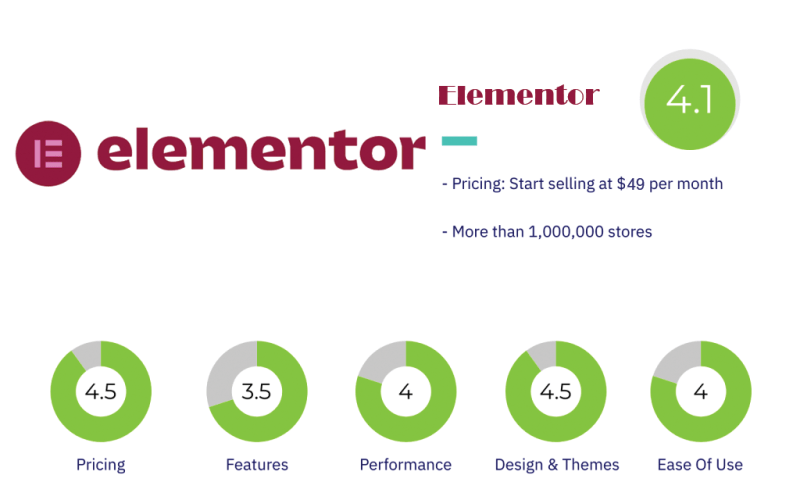Top 5 Ecommerce Platforms For Small Business
In the process of technology development, more and more e-commerce stores have sprung up, and traditional businesses have also gradually entered the e-commerce world. The ripple problem for small businesses is choosing a suitable e-commerce platform to grow their business among the numerous e-commerce platforms available in the market. To help these businesses have references as well as bring useful information to readers, please read the post: Top 5 Ecommerce Platforms For Small Business.
Choosing the best e-commerce platform for businesses
Choosing the right e-commerce platform is like directing the company’s growth. Each e-commerce platform has their own advantages, suitable for the strict requirements of the business. Our experts evaluate platforms based on criteria: Pricing, Features, Performance, Design & Themes, Ease Of Use. Scores are approximate based on small business requirements.
5 Best Ecommerce Platforms For Small Business
1. Shopify

It is indispensable for Shopify when it comes to leading e-commerce platforms. If you want to start a small to midsize store business, it is the best option available today. Shopify offers a full range of sales features, along with diverse app store features and 24/7 customer support that will make you happy.
Pros:
- Large range of themes available.
- Lot of plugins to choose from.
- Unlimited products on all plans.
- Integrated payment options.
- 24/7 support.
- Fully hosted platform.
Cons:
- Limited blog features.
- URL structure unfriendly to SEO.
- Fees quickly add up.
2. Wix

When it comes to price and creativity, the Wix is always the top choice. Wix gives you absolute creativity in your store through its drag-and-drop store builder. Performance is also optimized for devices.
Pros:
- Can start plans free.
- Many quality themes for your website.
- Wide choice of apps and plugins.
- Extensive coupon options and discounts.
Cons:
- Limited Ecommerce features.
- Difficult to add additional functionality (Not Open Source).
3. BigCommerce

BigCommerce is the ideal platform to sell on multiple platforms and channels. Is the choice of small businesses that have business expansion plans. Grow your business at a relatively low cost. However, the advanced functions take a long time to learn and use.
Pros:
- No transaction fees.
- Unlimited products.
- Easily add product variants and options.
- Solid SEO features.
- Good for selling across multiple channels.
Cons:
- No Multi-Language Store.
- Little free themes are available.
- Advanced features can compromise ease of use.
4. Magento 2

Magento has emerged as one of the oldest and successful e-commerce platforms. Some big companies around the world use it to manage a large number of products, orders, … In addition, Magento also supports external sales channels. Customers can also add features to the store with an extensive plugin inventory. Magento is perfect for delivering a premium selling experience.
Pros:
- Open Source.
- Large support community.
- Huge of extensions to choose from.
- Excellent for global store.
- Magento Open Source is free.
Cons:
- Magento Commerce is very expensive.
- Quite difficult to use.
- Technical knowledge is required to set up.
5. Squarespace

Squarespace is a great e-commerce platform for companies who want to get creative on their own. Integrated with social media channels. This is the right choice for businesses that want to invest in an eye-catching website. However, e-commerce features are limited.
Pros:
- Excellent social network integration.
- Lots of great templates to choose from.
- 24/7 customer support.
- Free domain with annual plans.
Cons:
- Large transaction fees.
- Limited payment options.
- There is no app market.
- E-commerce features are still limited.
6. Elementor

If you have your heart set on a WordPress-based online store but lack serious coding chops, Elementor is your go-to platform. Boasting a powerful WooCommerce website builder, Elementor empowers anyone to create a comprehensive, stunning WooCommerece site without writing a single line of code.
Pros:
- Huge array of complementary plugins.
- 20+ Ecommerce widgets.
- Full Site Kits.
- Hundreds of templates.
Cons:
- You have to pay for hosting.
- No free plan for ecommerce websites.
Conclude
It is up to you to choose the right e-commerce platform for your business. Each e-commerce platform will suit the different requirements of businesses. I hope through this post you will have the right choice for your business.
Follow us for the more helpful posts!
We hope this is a useful post for you.
Thank you for reading!
